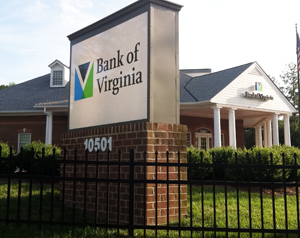A Midlothian bank is making a big bet on student loans.
Bank of Virginia and its parent company Cordia Bancorp have launched a new business unit to try to capitalize on what they see as an untapped sector of the college debt market.
The venture is known as CordiaGrad, an online student debt refinancing operation that hopes to win a share of what CEO Jack Zoeller said amounts to $1.3 trillion in outstanding student loan debt in the U.S.
Capturing even a fraction of that would mean another boost to the bank’s bottom line and another step in Cordia’s plan of distancing the bank from the doldrums of the downturn.
The idea for CordiaGrad, Zoeller said, is to help a certain segment of college graduates realize that the common practice of refinancing can extend beyond its typical place in the mortgage market.
“In the mortgage market, everybody knows if rates drop, you should refinance,” Zoeller said. “But nobody has really done that in the student loan market.”
CordiaGrad will target people mostly in their 20s and 30s but will also try to reach people in their 40s and parents with their children’s loans in their names.
The company spent seven months setting up underwriting standards for its online application and approval system in an attempt to weed out riskier borrowers.
“This is for students who have graduated, have their degrees, have a job and are paying big bucks on their student loans,” Zoeller said. “We’re trying to offer them some combination of savings in lower rates and shorter terms.”
Once a borrower goes through the online system, CordiaGrad would pay off his or her existing student loans and set up a new loan in its own pool.
With new staff hired for the project and a new office in Washington, D.C., the new venture is another example of Cordia taking Bank of Virginia into waters that aren’t typically tested by small community banks.
The $300 million bank, founded in Midlothian 2004, first tested the student loan market by buying tens of millions of dollars into pools of rehabilitated government guaranteed student loan pools.
That experienced helped the bank see the potential of that lending segment to add to the bank’s interest income.
“We’ve been in student loans for three years now,” Zoeller said. “We’ve learned a lot.”
With CordiaGrad, the bank will be in competition with much larger national players for the student loan refi market. The two biggest competitors, Zoeller said, are SoFi and CommonBond.
There’s also a crowded market for loan consolidation. But Zoeller said CordiaGrads’s platform for refinancing differs from the typical practice of consolidating student loans in that it is only targeting lower-risk borrowers.
“The key to providing low rates to the borrowers and to us making a profit is people with good credit and if they have proved at least some level of stable employment,” he said.
The biggest challenge for CordiaGrad will be drumming up the demand and letting people know refinancing is an option for student loans. On its side, Zoeller said, is the increasing national discussion over the long-term effects of college debt.
“The word is out that student loan debt is a problem,” Zoeller said. “It’s really a problem for the economy. There’s general awareness that it’s going to hold back a generation from buying a house or starting a family – all those things that take hunks of cash as you go through early to mid-adulthood.”
Zoeller and the Cordia group bought control of Bank of Virginia about five years ago as it was stumbling through the recession.
They arrived with fresh capital and a turnaround plan and brought the bank back to profitability. The company has raised about $30 million since 2010, most recently bringing in $15.4 million from a combination of Cordia executives, directors and about half a dozen investment firms last April.
Zoeller would not discuss exactly how much of an investment the company has made in CordiaGrad, nor would he talk specifics about the financial projections they have in mind for the initial launch.
“It’s a major launch, and we believe there is a huge market need and it’s really an underdeveloped need,” he said. “We put in a lot of time and smarts and obviously some money. As the word gets out, we would anticipate pretty good volume.”
A Midlothian bank is making a big bet on student loans.
Bank of Virginia and its parent company Cordia Bancorp have launched a new business unit to try to capitalize on what they see as an untapped sector of the college debt market.
The venture is known as CordiaGrad, an online student debt refinancing operation that hopes to win a share of what CEO Jack Zoeller said amounts to $1.3 trillion in outstanding student loan debt in the U.S.
Capturing even a fraction of that would mean another boost to the bank’s bottom line and another step in Cordia’s plan of distancing the bank from the doldrums of the downturn.
The idea for CordiaGrad, Zoeller said, is to help a certain segment of college graduates realize that the common practice of refinancing can extend beyond its typical place in the mortgage market.
“In the mortgage market, everybody knows if rates drop, you should refinance,” Zoeller said. “But nobody has really done that in the student loan market.”
CordiaGrad will target people mostly in their 20s and 30s but will also try to reach people in their 40s and parents with their children’s loans in their names.
The company spent seven months setting up underwriting standards for its online application and approval system in an attempt to weed out riskier borrowers.
“This is for students who have graduated, have their degrees, have a job and are paying big bucks on their student loans,” Zoeller said. “We’re trying to offer them some combination of savings in lower rates and shorter terms.”
Once a borrower goes through the online system, CordiaGrad would pay off his or her existing student loans and set up a new loan in its own pool.
With new staff hired for the project and a new office in Washington, D.C., the new venture is another example of Cordia taking Bank of Virginia into waters that aren’t typically tested by small community banks.
The $300 million bank, founded in Midlothian 2004, first tested the student loan market by buying tens of millions of dollars into pools of rehabilitated government guaranteed student loan pools.
That experienced helped the bank see the potential of that lending segment to add to the bank’s interest income.
“We’ve been in student loans for three years now,” Zoeller said. “We’ve learned a lot.”
With CordiaGrad, the bank will be in competition with much larger national players for the student loan refi market. The two biggest competitors, Zoeller said, are SoFi and CommonBond.
There’s also a crowded market for loan consolidation. But Zoeller said CordiaGrads’s platform for refinancing differs from the typical practice of consolidating student loans in that it is only targeting lower-risk borrowers.
“The key to providing low rates to the borrowers and to us making a profit is people with good credit and if they have proved at least some level of stable employment,” he said.
The biggest challenge for CordiaGrad will be drumming up the demand and letting people know refinancing is an option for student loans. On its side, Zoeller said, is the increasing national discussion over the long-term effects of college debt.
“The word is out that student loan debt is a problem,” Zoeller said. “It’s really a problem for the economy. There’s general awareness that it’s going to hold back a generation from buying a house or starting a family – all those things that take hunks of cash as you go through early to mid-adulthood.”
Zoeller and the Cordia group bought control of Bank of Virginia about five years ago as it was stumbling through the recession.
They arrived with fresh capital and a turnaround plan and brought the bank back to profitability. The company has raised about $30 million since 2010, most recently bringing in $15.4 million from a combination of Cordia executives, directors and about half a dozen investment firms last April.
Zoeller would not discuss exactly how much of an investment the company has made in CordiaGrad, nor would he talk specifics about the financial projections they have in mind for the initial launch.
“It’s a major launch, and we believe there is a huge market need and it’s really an underdeveloped need,” he said. “We put in a lot of time and smarts and obviously some money. As the word gets out, we would anticipate pretty good volume.”


Refinancing student loan debt is what I would term a necessary evil. Shameful, that to achieve a level of higher education so many have to capitulate to the principles of economics often taught in undergrad. Student loan debt handcuffs those trying to invest in the very future they mortgaged themselves to obtain. There are roadblocks when trying to right another economic principle of home ownership. Mortgage lenders baulk at the debt to income ratios applicants often present, at a time when interest rates are at historical lows. Student loan debt averages $333.00 monthly, significantly impacting their ability to invest in… Read more »